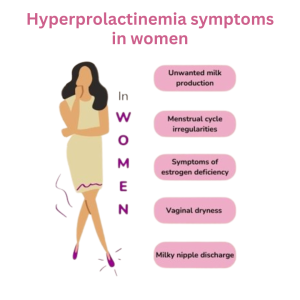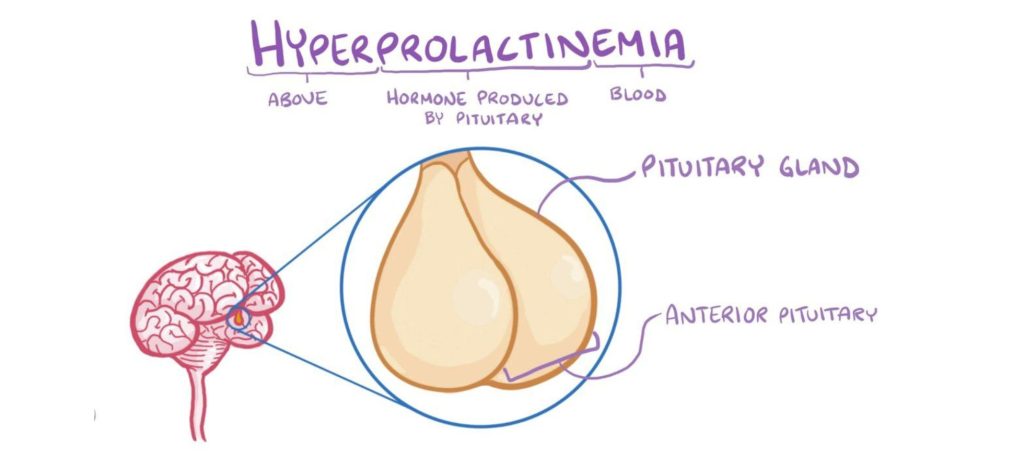Sorry, nothing in cart.
Hyperprolactinemia: Symptoms, and Management Strategies
- By admin
- |
- Uncategorized
- |
Hyperprolactinemia is a medical condition characterized by elevated levels of prolactin in the blood. The most common cause is a Prolactinoma, a benign (noncancerous) tumor in your pituitary gland. Prolactin is a hormone produced by the anterior pituitary gland, located at the base of the brain. While prolactin primarily stimulates breast milk production (lactation) in pregnant women, it also influences reproductive health, menstrual cycle regulation, and overall hormonal balance.
Hyperprolactinemia, characterized by elevated levels of prolactin in the blood, can manifest with various symptoms, which may differ between men and women. Here are common symptoms associated with hyperprolactinemia:
Hyperprolactinemia symptoms
Symptoms in Women
 Menstrual Irregularities:
Menstrual Irregularities:
Changes in the menstrual cycle, including irregular periods, infrequent menstruation (oligomenorrhea), or absence of menstruation (amenorrhea).
Galactorrhea:
Spontaneous, inappropriate milk production from the breasts not associated with breastfeeding or childbirth. This can range from a few drops to a continuous flow.
Infertility:
Difficulty conceiving or becoming pregnant due to disruption of ovulation and menstrual cycles caused by elevated prolactin levels.
Decreased Libido:
Reduced interest or desire for sexual activity, which can be related to hormonal imbalances associated with hyperprolactinemia.
 Symptoms in Men
Symptoms in Men
Erectile Dysfunction:
Difficulty achieving or maintaining an erection during sexual activity, often due to hormonal disturbances caused by elevated prolactin levels.
For patients with hyperprolactinemia experiencing difficulty achieving or maintaining an erection during sexual activity due to elevated prolactin levels, adding Cenforce 100mg (sildenafil) may be considered as part of their treatment plan.
Decreased Libido:
Reduced interest or desire for sexual activity, which can affect sexual performance and satisfaction.
Infertility:
Decreased sperm production or impaired sperm function, leading to reduced fertility or infertility in men.
General Symptoms (Both Sexes):
Headaches:
Headaches, ranging from mild to severe, can occur due to the pressure exerted by pituitary tumors or hormonal fluctuations associated with hyperprolactinemia.
Visual Disturbances:
Changes in vision or visual disturbances, such as blurred vision, double vision (diplopia), or peripheral vision loss, may occur if a pituitary tumor compresses the optic nerves or chiasm.
Bone Health Issues:
Prolonged hyperprolactinemia can lead to reduced bone density and increased risk of osteoporosis, which may manifest as bone pain or fractures.
Emotional and Psychological Effects:
Hyperprolactinemia and its associated symptoms can have psychological repercussions, including stress, anxiety, depression, and negative impacts on self-esteem and quality of life.
Hyperprolactinemia treatment in females
The treatment of hyperprolactinemia in females aims to lower prolactin levels, restore normal menstrual cycles, improve fertility, and alleviate associated symptoms such as galactorrhea. Treatment options may vary depending on the underlying cause of hyperprolactinemia and individual factors such as age, reproductive goals, and the presence of other medical conditions. Here are common treatment approaches:
1. Medications:
Dopamine Agonists:
- Dopamine agonist medications, such as Cabergoline 0.25 are the primary treatment for hyperprolactinemia.
- These medications work by stimulating dopamine receptors in the pituitary gland, which inhibits prolactin secretion.
- They are highly effective in reducing prolactin levels, restoring ovulation, and improving fertility.
- Cabergoline is often preferred due to its longer duration of action and fewer side effects compared to bromocriptine.

2. Surgical Intervention:
Transsphenoidal Surgery:
- Surgical removal of a prolactin-secreting pituitary tumor (prolactinoma) may be recommended if medications are ineffective or if there are complications such as visual disturbances due to tumor compression.
- Surgery is usually considered for larger tumors that do not respond well to medication or in cases where there is concern about tumor growth despite treatment.
3. Management of Symptoms:
Galactorrhea Management:
- If galactorrhea (inappropriate milk production) persists despite treatment with dopamine agonists, it can be managed with supportive measures such as wearing breast pads and avoiding nipple stimulation.
- Severe or persistent galactorrhea may require additional medical evaluation and treatment.
4. Monitoring and Follow-Up:
Regular Monitoring:
- After initiating treatment, regular monitoring of prolactin levels is necessary to assess treatment response and adjust medication doses if needed.
- Imaging studies, such as MRI, may be repeated periodically to evaluate tumor size and response to treatment.
5. Lifestyle Modifications:
Stress Management:
- Stress reduction techniques such as relaxation exercises, mindfulness, and counseling may be beneficial as stress can exacerbate hyperprolactinemia.
Important Considerations:
Pregnancy Planning:
- Women of childbearing age with hyperprolactinemia who desire pregnancy should discuss fertility goals with their healthcare provider.
- Dopamine agonists may need to be adjusted or temporarily discontinued during pregnancy, as they are generally not recommended during pregnancy due to potential effects on the developing fetus.
Side Effects and Adverse Reactions
- Women should be informed about the potential side effects of medications used to treat hyperprolactinemia, such as nausea, dizziness, and hypotension with dopamine agonists.
- Regular follow-up visits with a healthcare provider are essential to monitor for side effects and ensure optimal treatment outcomes.
Treatment decisions should be individualized based on the severity of symptoms, the underlying cause of hyperprolactinemia, and the patient’s reproductive goals and preferences. Close collaboration between the patient and healthcare provider is essential for successful management of hyperprolactinemia in females.
Conclusion
Hyperprolactinemia, characterized by elevated levels of prolactin in the blood, can cause various symptoms, including headaches and reproductive issues such as erectile dysfunction (ED) in men and menstrual irregularities in women. Effective management requires a comprehensive approach

